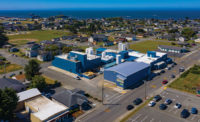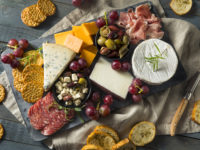Rumiano Cheese Co. is a cheese-making trendsetter
As it celebrates its 100-year anniversary, forward-thinking Rumiano Cheese Co. looks to new opportunities to expand










In certain ways, the story of Rumiano Cheese Co. sounds a lot like the American dream. It all began when the Rumianos emigrated from Northern Italy to the San Francisco area during World War I to work first in the mines, and then in the shipyards. A century later, their flourishing cheese company is still in the family.
Of course, there were a few hiccups along the way. At first, the Rumianos tried to get into the liquor business. However, Prohibition was right around the corner and so was the Mafia.
“The Mafia told them, ‘We need part of the cut,’” said Baird Rumiano, co-owner and president of Rumiano Cheese (as well as a third-generation family member). “So they said, ‘I think we will go in the dairy business.’”
The Rumianos bought a 200-acre ranch in Willows, Calif., where the company is still headquartered today, and started milking cows. Now the cheese company — the oldest family-owned one in California — has distribution in all 50 states (and internationally). And it’s only getting started.
To the moon and back
Though Rumiano Cheese began as a dairy, that soon changed when Baird Rumiano’s uncle, Fred Rumiano, decided to attend a cheese-making course at University of California – Davis. When he returned, the company began to produce an aged cheese that it still manufactures today.
“It is made exactly the same way we made it a hundred years ago,” said Baird Rumiano. “It is called dry Monterey Jack. It is our signature product.”
At first, Rumiano Cheese was a hyper-local operation. Then World War II broke out. Baird Rumiano’s grandfather built a cheese repurposing plant to meet the demand for processed cheese on the European and Asian fronts. The company grew from two cheese factories to six — all located in California.
“They were making American 5-pound blocks, which they would send to the military,” Baird Rumiano added. “Then they would chop them up and put them in what they called K rations.” (The K rations were cans given to soldiers that usually contained a shirt, socks, cigarettes and also little chunks of the cheese in foil packets.)
Once the war ended, the demand for processed cheese died off. The company shrunk back to two factories — the original one in Willows and another by the Oregon border in Crescent City, Calif., where the company still manufactures its products today. The Rumianos decided to keep the Crescent City location because of the temperate climate that helps sustain a high-quality milk shed, Baird Rumiano said.
“We are on this natural plain here on the ocean,” he added. “It never gets real hot here. It never gets real cold. Our average temperature is 55 degrees [Fahrenheit] year-round.”
This next era of Rumiano Cheese was an exciting time of innovation, Baird Rumiano said. His father became president of the company and played around a lot with how it manufactured cheese. One major accomplishment was feeding the Apollo 11 astronauts when they returned from the moon. Rumiano cheese was part of an omelet the astronauts received for their first breakfast while quarantined on Earth on July 25, 1969.
Growth through innovation
After his father’s death in 1978, Baird Rumiano and his brother John bought the company.
“We had this vision that we really wanted to be the best cheese there was in the world,” Baird Rumiano said.
The brothers had big plans for Rumiano Cheese, and they made early investments to ensure growth, including purchasing a vacuum sealer, a milk separator (to launch its butter production) and a block-former.
Another investment in the company’s future was in 2003, Baird Rumiano said, when Rumiano Cheese decided to go organic. The company took it a step further in 2011 when its cheese became the first Non-GMO Project Verified organic cheese in the country. The decision to produce mostly organic products helped Rumiano Cheese find its marketplace niche, Baird Rumiano said. Today, over 70% of the products the company manufactures are still organic.
In 2011, Rumiano Cheese looked to other opportunities to expand in the organic space and constructed a whey protein concentrate (WPC) facility. There was a lot of demand for organic WPC, and very few companies were producing it.
Rumiano was also on top of the grass-fed dairy trend early on. Baird Rumiano said he’s noticed the recent exponential growth of this type of dairy, but that it wasn’t always the case. He was once questioned about the color of Rumiano’s cheese while attending a cheese competition in Wisconsin. People wanted to know why it was super yellow when most of the other cheeses there were white.
“I said, ‘Because these cows are eating grass and get the natural carotene out of there, and that’s what makes the cheese so yellow,’” Baird Rumiano continued.
Rumiano Cheese’s reputation for award-winning cheese has helped fuel the company’s growth. Baird Rumiano’s son, Joby Rumiano, has been instrumental in getting more recognition for the company’s cheeses. He said he frequently enters them into competitions to build brand awareness.
The company’s numerous accolades date back to the late 1920s and include a Bronze medal in the unsalted butter category of this year’s United States Cheese Competition, first place for its dry Monterey Jack in the 2016 American Cheese Society contest and a Gold medal in the Hard Pressed Cheese division of the 2013 World Cheese Awards.
California flavors
In addition to its sales of WPC and lactose, Rumiano Cheese’s success is built around three different product lines, said Joe Baird, CEO. (He’s not formally a family member, though he has known the Rumianos for 25 years).
One is a national line, Rumiano Organics, which is the No. 1-selling cheese in the natural grocery store segment. The line also has wide distribution in Costco and growing distribution in traditional grocery stores. It features cheese in chunks, slices, shreds and cups, as well as butter and ghee.
“That continues to be a high-growth part of the business,” Joe Baird said.
Another line — California Crafted — features the company’s traditional artisanal cheeses. The cheeses are made the same as they were 100 years ago: aged in the caves that Baird Rumiano’s uncle built in the Willows facility. Cheese varieties include dry Monterrey Jack and Peppato.
“This is not, probably, a very highly profitable piece of business for us, but we think it’s important to really carry that forward, as that’s the foundation and the heritage of the business,” Joe Baird said.
The final line is Rumiano Redwood Coast, which is meant to be a “hometown flavor” for California. The line is where Rumiano Cheese channels a lot of its more experimental ideas before seeing if they would work on a national level. Varieties include Sriracha Jack, Mango Habanero and Island Fire Dance. The plan is to develop six to eight flavors and then rotate them seasonally so three are available in California stores at any given moment, Baird Rumiano said.
“It really allows us to not only bring great product, but also reflect the different communities in California,” Joe Baird added.
Rumiano Cheese also is launching a new product line this September called Raised to Matter. The offerings will center on functional nutrition and build on the success the company has seen with products such as ghee. The idea behind its functional nutrition line is to ensure Rumiano Cheese provides as much value as possible to the local farmers with whom they work. Joe Baird said that since Rumiano Cheese already produces WPC and lactose, the company thought about what it could produce with those milk components instead of simply selling them as ingredients.
“We have 14 products under development in that line,” he added. “Not all of them will make it out to the pipeline, but there’s a lot of R&D in that area.”
Prototyping process
To further its consumer reach, Rumiano Cheese wants to be at the forefront of new food trends. According to Joe Baird, the company has reenergized its product development in the past 18 months. As it is located relatively far from urban centers, it relies on outside help to learn about consumer demand. The company recently hired a product development team in Southern California to help it brainstorm ideas.
“We operate in very rural areas, which is fantastic because that’s where the cows are, and we’re able to make these incredible products,” Joe Baird added. “But we’re not necessarily directly connected to the consumer. And so we thought it was important to have product ID and product innovation come out of urban areas where we have a lot of consumers with diverse needs.”
An additional source of inspiration is its national sales team, which is in frequent contact with urban consumers and thus gets a sense of what they’d like to see in their dairy products. This includes co-owner John Rumiano, who is based in Willows, which is only a couple hours from San Francisco. According to Joe Baird, it’s common for John to be out in the field talking to customers, and immediately call his brother about a product he’d like him to experiment with in Crescent City.
This process has worked for Rumiano Cheese because its relatively small size allows it to be nimbler and open to experimentation. It is able to listen to the market, make a small batch of a new product, launch a prototype and then see if it’s worth scaling up production.
“I believe a really unique thing about our cheese-making process is that we can do small batch very quickly,” Joe Baird said.
Fast prototyping also has allowed Rumiano Cheese to improve on initial product ideas. For example, it introduced grass-fed ghee at Natural Products Expo West. After returning with consumer feedback, the Crescent City plant staff tried adding cultures to the product.
“I like to encourage people to think that we’re a 100-year startup because we need to be always innovating and driving forward,” said Joe Baird.
Upside-down hierarchy
While only five family members currently work for the company, the idea of family goes beyond blood relations at Rumiano Cheese. Many current employees have been working there for decades, including a plant employee who’s been with the company for 40 years and taken only one sick day.
“We have created employment for the local community, from entry level to higher management, and we are fortunate that our employees are very loyal and many retire from the company after many decades of service,” said John Rumiano.
The close-knit nature of Rumiano Cheese includes its relationship with the 27 dairies near Crescent City that provide milk for its products. (In fact, Dairy Foods interviewed the Rumiano team at a local dairy that has had close ties to the family for decades.) Joe Baird said the company feels a responsibility for helping out local dairymen, who he fears are a dying breed as milk prices fall.
“Farming in general, dairy specifically, is under a transition. And we’re committed to really taking care of these farms and the farmers,” Joe Baird said. “It’s going to take a new level of investment and a long-term view to really make sure not only that we’re here 100 years from now, but [also that] those farms are here.”
This commitment to local dairymen has created what amounts to an upside-down pyramid hierarchy, Joe Baird said. The customer comes first, then the farmer, team member, manager and, finally, shareholder. Rumiano Cheese believes that if it focuses on customer and farmer needs first, everything else will take care of itself.
One way that the company is helping out dairy farmers is by creating opportunities for them to earn more money for their milk. It currently offers incentives for winter milk production and clean milk projects, and is focused on getting the farmers even more by becoming more efficient. Through reduced downtime and transportation costs, Joe Baird hopes more money will make it back to the farmer.
“It’s our job to not make the dairy farmers pay for the inefficiencies of the market,” he said.
Looking forward
100 years after its founding, Rumiano Cheese still shows no signs of slowing down. Joe Baird said that its sales are up 10% year-on-year, while many other dairy brands are struggling. The company’s butter sales are up 25% year-on-year, and its organic lactose sales also jumped in the last six months.
“We’re very pleased with the bright spots that are happening from a growth standpoint,” he added, explaining that the company plans to double its current distribution to 4,000 stores and increase its footprint in traditional grocery chains.
In addition to expanding its distribution and product offerings, Rumiano Cheese plans to grow by investing it its Willows-based co-packing operations. According to Baird Rumiano, this is a massive opportunity for the company, as no one west of Idaho does much packaging, slicing or cutting.
“The continued successful growth of our company has created the need for additional space,” added John Rumiano. “This fall, we will begin construction on a new 50,000-square-foot packaging plant here in Willows. This facility will be state of the art with lots of room to grow.”
The new packaging plant will bring the opportunity to respond to consumer trends such as convenience. But even more important, it will allow Rumiano Cheese to ensure its future success.
“We have a new plan. And that new plan is the plant,” said Baird Rumiano. “We think we can double or even triple the amount of packaging we can do in that. And we think that’s a huge, huge opportunity.”
Looking for a reprint of this article?
From high-res PDFs to custom plaques, order your copy today!











